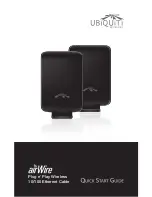
Configure Your Network in Dashboard
The following is a brief overview only of the steps required to add an MR42 to your network. For detailed instructions
about creating, configuring and managing Meraki wireless networks, refer to the online documentation
(
).
1. Login to
. If this is your first time, create a new account.
2. Find the network to which you plan to add your APs or create a new network.
3. Add your APs to your network. You will need your Meraki order number (found on your invoice) or the serial
number of each AP, which looks like Qxxx-xxxx-xxxx, and is found on the bottom of the unit. You will also need
your Enterprise license key, which you should have received via email.
4. Go to the map / floor plan view and place each AP on the map by clicking and dragging it to the location where you
plan to mount it.
Check and Upgrade Firmware
To ensure your MR42 performs optimally immediately following installation, it is recommended that you facilitate a
firmware upgrade prior to mounting your MR42.
1. Attach your MR42 to power and a wired Internet connection. See the "Power the MR42" section for details.
2. The MR42 will turn on and the LED will glow solid orange. If the unit does not require a firmware upgrade, the LED
will turn either green (no clients associated) or blue (clients associated) within thirty seconds.
* If the unit requires an upgrade, the LED will begin blinking orange until the upgrade is complete, at which point the LED
will turn solid green or blue. You should allow at least a few minutes for the firmware upgrade to complete, depending on
the speed of your internet connection.
Check and Configure Firewall Settings
If a firewall is in place, it must allow outgoing connections on particular ports to particular IP addresses. The most
current list of outbound ports and IP addresses for your particular organization can be found
.
Assigning IP Addresses to MR42s
All gateway MR42s (MR42s with Ethernet connections to the LAN) must be assigned routable IP addresses. These IP
addresses can be dynamically assigned via DHCP or statically assigned.
Dynamic Assignment
When using DHCP, the DHCP server should be configured to assign a static IP address for each MAC address
belonging to a Meraki AP. Other features of the wireless network, such as 802.1X authentication, may rely on the
property that the APs have static IP addresses.
7



































